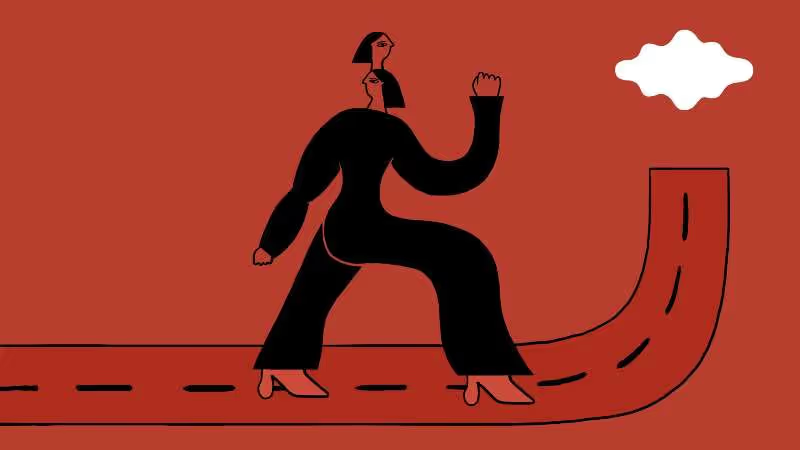Shall We Begin?
The New Normal is no longer new. As we pass the half year mark since the Covid-19 pandemic began to spread in America, the terrifying novelty of it all has worn down into an uncanny steadiness where I live. But in many parts of America, the Covid-19 spike has arrived relatively recently. I remember, in March, watching the viral video of Italians warning New Yorkers and Washingtonians what was coming for us. Today, no matter where you are, I want to tell you what’s coming for your closest relationships, and what to do about it.
You will yearn for specific people. For my husband and me, it was our adult children, who we had not seen after months of careful isolation. I still have not seen my oldest son because of international travel restrictions.
You will establish ground rules unlike any you’ve had before. I haven’t hugged anybody except for my husband and one of my sons.
You will occupy a “separate-but-together” state and it will even start to feel normal. So much so that…
You will make mistakes. I didn’t think twice about sharing my water with a friend while hiking six feet apart, not realizing that the habit has become a hazard. With one sip, months of worrying, cautiousness, and spatial negotiating were completely undone. I found myself saying what has become one of my most-used phrases these days: “If we can’t stick to our rules, what has all of this been for?”
You will come to find that it’s those tiny moments of intimacy that feel the hardest to restrict. Not just because it’s painful to deprive oneself of touch, but because…
Even the smallest lapse in judgement can set off “Pandemic Paranoia.” My husband and I have a lot in common but, like most couples, our differences become exacerbated in crises. Yours will, too. In the beginning of the pandemic, I was in constant anxiety mode, dreading that my husband would get sick and die. He, on the other hand, was in reassurance mode, which I like, but also frustrates me. One day, he told me he was going to go dig a hole in the yard so that I could throw him straight in the ground since I was so convinced he was going to die at any moment. It made us laugh harder than we had in weeks. (Our fears are quite different; our humor is shared.)
Humor will be a saving grace in your relationships. Humorous banter helps us avoid the ping pong of defensiveness that I see in so many couples. Let’s be honest, just because I’m anxious doesn’t mean I’m consistent. I’m yelling at my husband to put on a mask and then turning around to share my water with a friend. But by playfully chiding me for my hypocrisy, rather than outright calling me a hypocrite, my husband uses humor to help us navigate our stresses.
You may have less sex. Don’t fault yourself if sex isn’t top of mind right now. But try to have honest and open conversations with your partner about it. Articulating the reasons why you may be too stressed or sad to engage in intimacy may help you let go of some of those fears.
You may have better sex. According to a brand new study conducted by Kinsey Institute executive director, Justin Garcia, and Justin Lehmiller: nearly half of participants “reported that their sex life has declined and that they are less sexually active now,” however, “1 in 5 participants reported having expanded their sexual repertoire by incorporating at least one new activity into their sex life since the pandemic began.”
You will experience a new type of intimacy with strangers, like a shared wink in the supermarket acknowledging the silliness of negotiating proximity in an aisle, or thanking a cashier with new depth of gratitude.
Despite the anxiety and grief, you will experience a new level of clarity. This is a moment of mass reprioritization. You’ll assess your finances. You’ll assess your health. You’ll assess what’s been working well in your life and what hasn’t been. What you want? Where do you want to be? Whom do you want to be with? What do you want to build?
But you will also experience a new level of confusion that will lead to fights. And it won’t just be with a partner. Maybe it’s your daughter who wants to take a trip with her friends, or your sibling who refuses to wear a mask around mom and dad. Or maybe it’s the neighbors who have stopped inviting you to barbecues because they think you’re too careful or not careful enough.
You’ll become an expert in other’s rigidity while failing to see your own. You’ll see how unbending and narrow-minded they are, how they lack empathy, and how maddeningly frustrating they can be. But the rhythm of escalation is that one person’s stance reinforces the other’s. The more you hammer that your partner NEVER does the dishes, that you MUST move closer to your parents, or that they’re CRAZY to want the kids to play with other kids in a pandemic, the more they will respond with the same totalistic language.
You and your partner will delegate emotions to each other more than you usually do. One will maximize; the other will minimize. One will explode; the other will implode.
You’ll have to remind each other that you’re on the same team, instead of each becoming the rigid flag holder of half of a dilemma. When your polarization escalates to anger and blame, you’ll engage in one of the three dances: fight-fight, fight-flight, or flight-flight. Polarization is the perfect stalemate.
You’ll have to acknowledge that neither of you have all the answers. We’re confusing technical challenges with adaptive challenges. As Dr. Ronald A. Heifetz explains: technical challenges can be fixed easily by a known improvement, whereas adaptive challenges have no known procedures or outcomes. They demand that we review our fundamental assumptions and values. Adaptive challenges require new skills, taking divergent positions, and most importantly, greater tolerance for uncertainty.
You’ll have to remind yourself to hold the multiplicity of solutions as well as your doubt. The possibilities are overwhelming—that’s why dig our heels into strict perspectives in the first place. Make no mistake though, rigidity and false certainty may give an illusion of control, but it’s the opposite of resilience. For me, it helps that my husband is a trauma expert. As he says, resilience is about bouncing back and forward—that demands flexibility, nimbleness, and the ability to adapt.
You’ll find ways to be softer with each other. After months of this, I can tell you that you’re going to tire yourself out. Navigating the ying yang of your relationships and coping mechanisms to find consensus in an era of prolonged uncertainty is hard work.
You’ll get to know your loved ones in a brand new way. It will be overwhelming at times and it will be hard. But at the end of day—day after day after day—you’ll find yourself still surrounded, physically or virtually—with many of the same people and the same problems. You will have to navigate many stalemates, but it will make your relationships stronger, with others and with yourself.
Let’s Turn the Lens on You
When I want to get out of stalemate, I draw on Barry Johnson’s Polarity Management Grid.
- Draw a cross. This is your grid. On the left side is Position A. On the right side is Position B. On the top left quadron, the person with Position B will list the positive aspects of the OTHER’S argument. On the bottom left, they will list the negative aspects. On the right side, the person with Position A will do the same for the OTHER ARGUMENT.
- Let’s say Position A is letting your kid play with other kids and Position B is keeping them home. Position B will write the positives of Position A (“it will make them less lonely; they will spend less time on screens; they need social time) and the negatives (they have asthma; grandma lives with us). Position A will do the same for Position B.
- When we only list the positives of our position, the other person becomes tasked with emphasizing the negatives. But if we include both the positives and negatives in our own arguments and for each other’s arguments then it will help us come to a decision that considers all factors and helps us see eye to eye, even if we don’t completely agree.
Let's continue the conversation.
Watch the replay of the Letters From Esther Workshop: In a Relationship Standoff? Here's How To Get Out.
More From Esther
Feeling Alone in a Relationship? You’re Not Alone. / a recent blog
Over the last decade, we’ve experienced a new type of loneliness—the loss of connection, trust, and capital while we are next to the person with whom we’re not supposed to be lonely. Read more about feeling alone in a relationship, how it's intensified in the midst of crisis, and what you can do to reconnect
What Is This Feeling? Anticipatory Grief and Other New Pandemic-Related Emotions / a recent blog
The unprecedented crisis caused by the novel coronavirus has left us with a set of unfamiliar emotions. Read more to learn about these new emotions you may be experiencing and what to do about them
Where Should We Begin? Pod Club / on Instagram Live
In our first Pod Club, producer Jesse Baker and I discussed episode one of season four: “You Want Me To Watch The Kids While You Go Out With Another Guy?”
Conversation Starters
A compendium of highly recommended sources of inspiration and information
I’m Experiencing:
- Pauline Boss on navigating loss without closure (Krista Tippett’s podcast On Being)
- “Sex in a Pandemic: For Liberals, More Netflix and Less Chill” by Justin Lehmiller (Politico)
- “Decameron Row,” a virtual global neighborhood of people capturing daily life in pandemic times
- “Beanpole,” a film by Kantemir Balagov
- “Touch Me Not,” a film by Adina Pintilie
- “Watchmen,” a show by Damon Lindelof
- “I May Destroy You,” a show by Michaela Coel







.svg)





